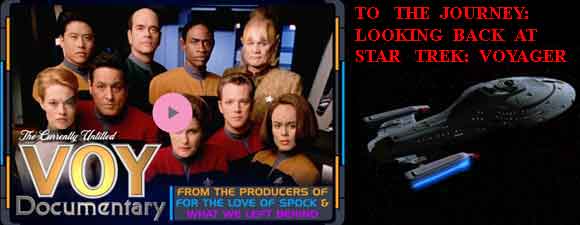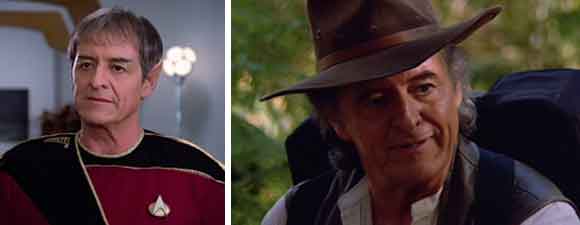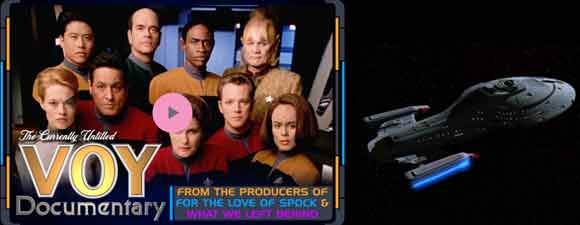Retro Review: Sacred Ground
7 min read
sacredgroundbanner
When Kes is nearly killed by an alien energy surge, Janeway undergoes a religious ritual to try to save her.
Plot Summary: While exploring the sacred chamber of the Nechani, Kes gets too close to a shrine and is knocked unconscious by a biogenic energy surge. The Nechani leaders tell Janeway that Kes has angered the spirits and is going to die, and the Doctor is forced to agree that the latter may be true if they don’t discover how the Nechani monks survive contact with the shrine. Upon learning of a local legend about a king who retrieved his son’s soul from the spirits, Janeway asks to reenact the king’s ritual. As Chakotay and the Doctor monitor her life signs, Janeway is taken by a guide to be dressed in a monk’s robe, painted with symbols, and left in a chamber to wait with others. Impatiently, she demands that her guide help her get on with the proceedings to save Kes. The guide accompanies Janeway on several physically arduous challenges. The Doctor tells Chakotay that the captain’s muscles appear to be under physical strain, but she is in no danger. Though the guide warns Janeway that the ritual is meaningless unless she reaches the spirits, Janeway assumes there is a scientific rationale to the proceedings and allows herself to be bitten by a poisonous nesset. She has a vision of a seashore where her guide tells her that she has everything she needs to save Kes, but reminds her that the ritual is meaningless. Pleased, Janeway returns to the ship, where the Doctor tries to synthesize a treatment for Kes based on Janeway’s physiological changes. The treatment fails and the Doctor tells Janeway that her efforts appear to have been meaningless. Hearing this echo of her guide, Janeway returns to the surface, asking to try again. This time she waits in the outer chamber and agrees to open her mind to possibilities that can’t be explained by her science. She has Kes beamed down and carries her back into the biogenic energy, which revives Kes. Though the Doctor tries to explain this outcome medically, Janeway considers that perhaps her scientific understanding of the universe does indeed have limits.
Analysis: The first time I saw it, I thought “Sacred Ground” was a wonderful episode, and even though the dialogue now seems stilted and the theme over-used, it’s easy to see what I loved about it, from its criticism of Starfleet’s imperialistic tendency to assume its science and technology must be superior to local beliefs to the fact that it forces Janeway to let her hair down and strips her bare – get your minds out of the gutter, I meant psychologically, taking away the crutch of her science, though I don’t blame anyone who appreciates seeing Kate Mulgrew half-naked either. In this era of climate-change denial and attempts to force creationism to be taught in public schools, I’m a lot less comfortable with the Nechani insistence that scientists must give equal weight to religious explanations of phenomena – obviously what they choose for their own lives is their own business, and it’s instructive for Janeway personally to contemplate the limits of science in a universe where there are beings capable of understanding so much more than dimensionally limited humanoids, but more and more I find Star Trek’s benevolent, tolerant technological future a comfort in an era of people who are all too comfortable saying things like, “She’s been punished by the spirits. She’s going to die.” Deep Space Nine managed a very careful balance, juxtaposing episodes in which the Kai demanded religious-only education for Bajoran children with episodes in which Sisko reminded fellow Starfleet officers that whether they called them wormhole aliens or Prophets, the beings watching over Bajor had powers incomprehensible to any science in the Federation. Given the extent to which Voyager‘s writers dropped the ball with Chakotay, portraying him initially as a questing man from a deeply spiritual culture, then reinventing him as an angry rebel, I’m not sorry to see Janeway consider not so much the limitations of science as the limitations of assuming her way is always the right way to approach problems.
I’m also not sorry to see Chakotay so worried about Janeway that he considers whether to save her life by cutting short the ritual, either, particularly since he lets neither personal attachment nor an overactive sense of a first officer’s duty countermand her request to complete her task. Although he questions her approach at first, reminding her that she’s never put much stock in religion, he reverts to his scientific training while sitting by the monitors with the Doctor and points out that he’s obligated to relieve her of duty if the hallucinogen from the nesset has impaired her judgment. It’s so confusing trying to figure out exactly what Chakotay believes – we saw him try to contact his animal guide several times during the first year of Voyager’s journey, but he said in “Tattoo” that he never believed in the Sky Spirits of his people. In “Sacred Ground” he admits to Janeway that when his mother taught him the science underlying his people’s vision quests, he felt disappointed. He doesn’t bring out the medicine wheel, which Torres used in Sickbay to try to guide Chakotay’s spirit back to his body during the events of “Cathexis,” to try to help Janeway find her path. Are we meant to believe that he continues with his own rituals not because he believes in them, but only because they make him feel connected to a home he’s lost? It’s clear that if he must choose between sacrificing Kes and putting Janeway’s life at risk, his personal and professional commitment are both to his captain. He’s not comfortable that she wants to complete the ritual, not only because he fears for her safety, but because, as he says more than once, it seems very unlike her, and it’s his responsibility to judge when he must override her orders for her good as well as everyone else’s. That he agrees to let her approach the shrine demonstrates the same bond we saw in “Resolutions” – both a first officer accepting the captain’s decision and a friend accepting that Kathryn is having a unique experience that he must trust her to bring to the conclusion they both want.
Is “Sacred Ground” a response to previous Star Trek stories in which Kirk and Picard used technology to enlighten what they considered to be backward aliens about the silliness of religion? With Kirk, he’s generally right to reject exploitative gods – counting just Apollo, Vaal, Landru, and “God” from the center of the Milky Way, the score is solidly Kirk 4, God 0 – and while Picard is usually more diplomatic, he has no qualms about unmasking Edo’s god to save Wesley Crusher or rewriting Mintakan theology to stop them from worshipping him. Janeway could have met the Nechani with a show of force, demonstrating that her science is as powerful as their spirits as Kirk was wont to do, but she chooses to listen, even when the government officials are being obfuscatory and the monks are ignoring her, making Torres predictably and Kim surprisingly angry. If it’s unexpected for the Doctor to be so cavalier about Janeway’s health in his desire to find a treatment for Kes, it’s equally unexpected for Neelix to hesitate and warn Janeway against risking herself to save his beloved given that the Nechani were willing to let Kes die just for disturbing their shrine, though the performances are gracefully managed by then-new director Robert Duncan McNeill, who since Voyager has spent more of his career directing than acting. I love Janeway in these early episodes before Seven of Nine, when she’s as often the student as the teacher, rarely the Starfleet bulwark, trying to figure out which instincts serve her best so far from home with so many people depending on her. Even when she’s being tested and strained in this episode, she seems open and joyful, climbing, painting, meditating, willing to stretch her emotional and spiritual barriers as well as the intellectual ones. “Sacred Ground” asks her and us to accept that there are more things in heaven and earth than are dreamt of in our philosophy, and even if science might at some point be able to uncover or explain them, it doesn’t make the sense of awe and wonder with which others approach them invalid or irrelevant. Twenty years later, even if I could do without all the Star Wars-sounding “You must feel the Force around you!” lines, that remains a powerful message.






